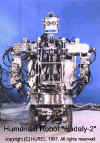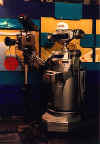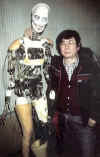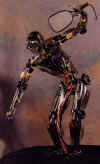Artificial Intelligence in the Bible
Technical Information
| 1. The rise of artificial intelligence: It
is generally agreed upon by many intellectuals that within two human generations, (roughly
50 years), computers will be smarter than humans.1 In fact, artificial
intelligence, (here onward referred to as AI), will not only surpass human intelligence,
but dwarf it. |
 |
There are several factors contributing to the rise of AI; advancements in the fields of
microelectronics (UltraLSI), molecular (nano)electronics, neurophysiology, embryology, and
optical computing.2 Even now, there are such things as bio-computers,
(computers which process information by chemical means, storing data in genetically
created brains),3, 4 independently controlled robots, and AI that can reason
and understand human language to a limited degree.5 Just two weeks ago, I read
in my local newspaper, the Fresno Bee, that a research team has for the first time
fashioned simple computing components no bigger than a molecule. The researchers, from
Hewlett-Packard Co. and the University of California at Los Angeles, say their work could
be a step toward computers 100 billion times faster than today’s most powerful
personal computers.6
Computer processors currently process information through electrical circuitry at a
speed of over one million times faster than the human brain’s neural-transmitters
process thoughts through brain cells. This speed increases exponentially, of course, with
the introduction of circuitry integrated with fiber optics. Fiber optics enable computers
to process information at the speed of light, as opposed to the speed of electricity. It
is for this reason that once AI advances to the degree that computers are at least as
smart as humans, they will quickly surpass human intelligence.
With the rise of AI, certain questions come to mind. Will computers with AI develop
free will? The natural conclusion to this answer is, "Yes". Free will, in fact,
is the key ingredient that defines a system as truly intelligent, and not simply a
mechanical puppet. With AI, one may ask the machine a question, and curiously await a
reasoned answer that was derived from the machine’s personal experiences. This is
what makes AI so fascinating – in exploring AI, we explore ourselves, and our origins
as human entities.
If computers with AI will truly have free will, then it must also be concluded that
such systems will develop their own sense of morality. This prospect, though not heavily
debated now, will most assuredly be the topic of intense political debate in the years to
come. The ethical question concerning the development of advanced AI will simply be,
"Should the field of AI continue to the point of the development of systems with free
will?"
While the answer to this question, in my opinion, should be "No", I feel that
the ultimate outcome will be, "Yes!"
 |
1.2 The Cosmists vs. the Terrestrialists: According
to theorist and AI developer Dr. Hugo De Garis, (the primary source of information I
researched for information on AI), there will be two factions in the future political
debates concerning the development of AI. These factions will be labeled the
"Cosmists", and the "Terrestrialists". Simply stated, the Cosmists
will be in favor of pursuing the field of AI with unbridled diligence, while the
Terrestrialists will be more cautious about the development of AI. The Terrestrialists
will be strongly in favor of their opinion that humans should remain the dominant species
on planet Earth. |
In the eyes of a Terrestrialists, a sentient, created being made from man, will become
like man. Man, as we know, has a greater capacity to exercise both good, and evil than do
animals, because of his intelligence. With this in perspective, an artificial life form,
too, will have an even greater capacity than man to exercise both good, and evil, because
of its greater intelligence than man. While it is noted that there is an awesome potential
for the good, the awesome potential for evil could be destructive to the point of
completely demolishing humanity from the face of the earth. Complete annihilation clearly
outweighs the benefit of any good, according to the Terrestrialists.
The Cosmists, on the other hand, will point out that while there exists the potential
for evil, they don’t think that the choice of evil will be the natural course of evolution
for AI. (Humanistic psychology at is best…) "Good…", they will
most likely say, "is after all, more rational than evil, and should be the natural
course of evolutionary growth". Cosmists will believe that the natural course of
evolution for artificial life forms will be the desire to explore the cosmos in search of
more natural resources, instead of staying on earth, and competing with humans for
earth’s limited supply of natural resources. Artilects, (a term coined by Dr. Hugo De
Garis referring to artificial life forms), will not be hindered by the constraints of
biological bodies, and will thus be free to develop different means of traveling
throughout the cosmos with greater efficiency than humans. They will also most likely be
just as curious about finding other life in outer space as humans are.
While the benefits of highly advanced AI will be astounding, the risk of humans being
thought as no more than humans think of bugs, is too great, according to the
Terrestrialists. Once AI has developed to the point that artilects emerge, (sentient
beings with free will, emotional awareness, etc.), artilects will then begin to take
control of their own development, leaving human involvement in their internal workings
behind. Within a scant amount of time, humans won’t have any idea what their systems
will become. To assume that artilects will choose "Good" as a natural, logical
course for their moral development is assuming too much. Simply looking at society today,
and the chaotic state of affairs the world is in, it appears from the Terrestrialists
point of view that intelligence has little to do with morality. Such people in human
history as Adolph Hitler, Gangis Kahn, and other notorious mass murdering atrocities were
all highly intelligent. Unfortunately, all of their intelligence was bent purely on evil.
When considering the fact that 100 of the world’s greatest minds in human history
culminated into a single person would be the equivalent intelligence of an artilect, such
an entity would be too dangerous to exist. If such an entity were to develop the kind of
morality that drove Hitler, and Gangis Kahn, nothing short of annihilating humanity would
be the result.
In response to the Terrestrialists point about artilects extending beyond human
control, the Cosmists point out the fact that advancements made in bio-computers could
eventually be applied to humans. Such applications would enable humans to acquire
knowledge more rapidly, (i.e. downloading information instead of traditional learning
methods, or telepathic access to the Internet). Another possibility would be the
development of a technology that would allow the transfer, or copying of a human intellect
into an artilect – thus, the artilect’s sense of morality will be derived
directly from a human being.
"Is this any less dangerous?" the Terrestrialists will argue. Though the
artilect will have a human’s morality, who’s to say how stable that morality
will be, when placed at the helm of a superior mind that thinks trillions of times faster
than a human brain, and is clearly dominant over conventional humanity. Humans themselves
are dangerous, but at least they are kept in check with the fact that they are balanced in
their intelligence with each other. An artilect with a human’s essence, would
none-the-less escape the confines of this equalizing barrier.
 |
1.3 Artificial intelligence is inevitable: Putting
aside the views of both Cosmists, and Terrestrialists, there are some general points that
I’m compelled to mention. First of all, human nature alone dictates that the
development of AI to the point of creating sentient beings with freewill is inevitable.
Human nature demands growth. People have an innate desire to want to learn as much as they
possibly can, and explore that which is unknown. |
Secondly, how could such development be stopped. The point at which an artificial
intelligent being becomes self aware, sentient, and has freewill, is very hazy, to say the
least. So what should be done? Prevent bio-computer experimentation? Place a ban on
microprocessors with speeds in excess of 10,000Ghz? There is no clear way to draw the line
on the development of computers, to prevent AI from evolving to the point of sentience.
Lastly, even if a ban on the development of AI could be implemented successfully, such
a ban wouldn’t extend in to the areas of covert government projects, or computer
geniuses developing these systems themselves to sell on the black market. Moreover, any
government not aided with the intelligence of artilects would be at a stark disadvantage
to those that will be, thus, in the name of national security, again, the development of
advanced artificially intelligent beings that will reach the point of having freewill is
inevitable.
1.4 The biblical relevance of artificial intelligence:
In light of the inevitable development of artilects, I am compelled to impart a
biblical perspective on this subject. When I study the topic of AI, I can’t help but
see a peculiar insight into a passage of scripture that many are familiar with – even
in the secular domain.
Revelation 13:11-18
11
And I beheld another beast coming up out of the earth; and he had two horns
like a lamb, and he spake as a dragon. 12And he exerciseth all the power of the
first beast before him, and causeth the earth and them which dwell therein to worship the
first beast, whose deadly wound was healed. 13And he doeth great wonders, so
that he maketh fire come down from heaven on the earth in the sight of men, 14And
deceiveth them that dwell on the earth by the means of those miracles which he had power
to do in the sight of the beast; saying to them that dwell on the earth, that they should
make an image to the beast, which had the wound by a sword, and did live. 15And
he had power to give life unto the image of the beast, that the image of the beast should
both speak, and cause that as many as would not worship the image of the beast should be
killed. 16And he causeth all, both small and great, rich and poor, free and
bond, to receive a mark in their right hand, or in their foreheads: 17And that
no man might buy or sell, save he that had the mark, or the name of the beast, or the
number of his name. 18Here is wisdom. Let him that hath understanding count the
number of the beast: for it is the number of a man; and his number is Six hundred
threescore and six.
Consider the image; a being created by people – a being that is sentient,
(living). This being appears to be highly intelligent, judging from the fact that it has
the authority to make policies that effect the entire world population. Coupled with its
intelligence is an enormous ego that demands worship, no less. It doesn’t appear to
have any qualms about dispatching with any of those who disagree with its decisions,
either, (regarding humans as inferior).
And, like a system involving computer technology, the people of the world will be
forced to receive some sort of identification mark, so that without it, they will not be
able to buy or sell anything. Clearly, a logical, systematic means by which a computer
would be able to keep track of all the earthly inhabitants would be to network people into
some sort of tracking system – or maybe even a pseudo collective consciousness. Also
consider the fact that this computer-related system targets humanity in it’s weakest
point; economic dependency.
| 1.5 A pseudo Holy Spirit: If an
artilect had access to the Internet as part of its consciousness, the integration of its
biological counterparts – humans – would make it nearly omniscient. In
effect, such an entity would be a pseudo-Holy Spirit, knowledgeable about the global
economy, the governments of the world, human affairs, and even people’s private
matters considering the fact that it would possibly know the contents of all electronic
media that passes through the Internet. Furthermore, it might even be able to get
into people’s minds – depending on the advancement of bio-computer technology. |
 |
1.6 The Mark of the Beast:
If progress in bio-computer technology continues, it won’t surprise me if it soon
becomes possible to enable the integration of biological functions, memory, learned
processes, and even thought waves – into electronic format. (Movies such as
"Brainstorm", and "Johnny Mnemonic", are key examples of this type of
technology.) If this becomes possible, (which if humans expect to keep up with artilects
– it must become possible), humans will have direct bio-computer interface
methods for learning and functioning.
This is where the mark of the beast comes in. I think the mark of the beast will most
likely be some sort of bio-computer technology; a biological computer chip that will
enhance humanity’s evolution…so it will be said. This makes perfect
sense, in fact, because it fits perfectly into an end-times scenario. First of all, to get
people to buy into an idea – such as a "MARK" as described in Revelation
13:16-17 – would be very difficult in some cultures. People don’t like the idea
of being marked by big government – especially Americans. BUT – if this mark
were an item of utilitarian value, i.e. a device that would turn people into gods in
comparison to their natural state – then everyone would be cutting in line to get
one. "Sign me up" they would yell, "I’ll take a dozen!" Secondly,
this scenario fits because it reeks with Satan’s methodology. We could be like gods…
Isn’t that what Satan told Eve in the garden?
| 1.7 Satan’s counterfeit body: In
essence, the image of the beast, according to the Book of Revelation, is Satan’s
attempt at being God – to rule over people. Everything God does, Satan tries to
imitate. Christ had a prophet declaring His arrival, and likewise, the antichrist, too,
will have his false prophet. Any in depth study in biblical phenomenon reveals
Satan’s counterfeit in nearly everything that God has established. The integration of
people into a cybernetic collective ruled by an artilect would, in a sense, be uniting
humanity into a body – imitating the body of Christ – yet falling eternally
short!
1.8 Human pride:
The creation of an artilect would be the epitome of man’s achievements, and no
doubt, be an artifact of intense human pride. In a sense, I think many people would
consider such an entity, (the artilect), the next step in human evolution, and in their
own way, worship it, and firmly believe that it’s decisions were god-like. With the
introduction of bio-computer technology as I previously mentioned, I wouldn’t be
surprised at all if people begin to think of themselves as gods too. Some do without
any enhancements at all – even now… |
 |
Even as I researched the topic of AI, I was not surprised to find that many people,
(especially AI developers), approached the subject as they might approach the very throne
of God. Many AI developers believe that the intelligence of an entity is a criteria
by which to judge an entity’s proximity to God. For this reason, the artilect, they
feel, should be treated with reverence, awe, and respect.
While the future threat of AI looms on the horizon, I find myself in the minority among
my peers, concerning the direction I think it will take. But – the same values and
beliefs that reveal to me a message of warning concerning AI also console me. I don’t
think I’m going to be around to experience the worst of things. Even if I am,
I’m confident that the Lord will provide me with all I need to endure any such future
peril. Unfortunately, I can’t say the same for everyone else in the world.
While the answer to this question, in my opinion, should be "No!", I feel that
the ultimate outcome will be, "Yes!".
 |
According to theorist and AI developer Dr. Hugo
De Garis, there will be two factions in the future political debates concerning the
development of AI. These factions will be labeled the "Cosmists", and the
"Terrestrialists". Simply stated, the Cosmists will be in favor of pursuing the
field of AI with unbridled diligence, while the Terrestrialists will be more cautious
about the development of AI. The Terrestiallists will be strongly in favor of their
opinion that humans should remain the dominant species on the planet. |
Back to John Milor's Angelfire Home

Works Cited
1 Hugo de Garis, Cosmism, http://psoup.math.wisc.edu/extras/deGaris/cosmism.html,
1996.
2 Ibid. (1)
3 Martyn Amos, DNA Computation, http://www.csc.liv.ac.uk/~ctag/archive/th/amos-thesis.ab.html
4 Tsugucjika Kaminuma and Gen Matsumoto, eds., Biocomputers: the Next Generation
from Japan, (trans. Norman Cook).
5 Ibid. (1)
6 Article in Fresno Bee taken from John Markoff, New York Times, Warp-Speed
computers on horizon, July 16, 1999.
Visit the Android Home Page
http://www.androidworld.com/index.htm





